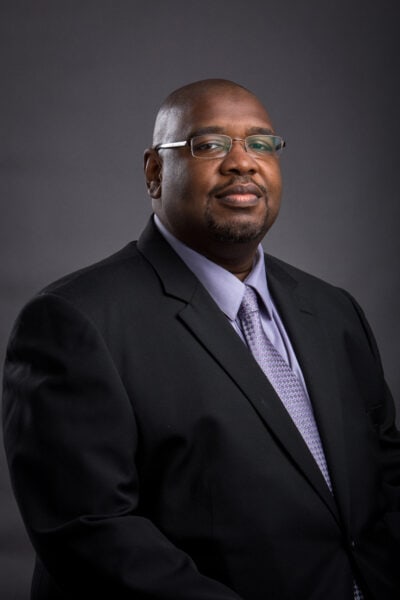Tony Frazier is an assistant professor at North Carolina Central University. He lives in Durham, North Carolina, and has been a member since 2010.

Alma maters: BA (history/political science), North Carolina Central University; MA, North Carolina Central University; PhD, Western Michigan University
Fields of interest: modern Europe, Black Europe, Atlantic slavery and emancipation, 19th and 20th-century African American, digital
Describe your career path. What led you to where you are today?
My sense of wonder about the world started when my mother purchased the complete set of the World Book Encyclopedia for our home. Likewise, my deep interest in African American history grew as I read the four-volume series Ebony Pictorial History of Black America. After high school my love for history continued when I entered the United States Navy and I kept reading every history book that I could borrow, buy, or get my hands on. After leaving the Navy, I enrolled at North Carolina Central University (NCCU) where I met two brilliant scholars and pioneers of Black European history, Dr. Lydia Lindsey and Dr. Carlton Wilson; both mentored and taught me about the African Presence in Europe. My desire to obtain a doctoral degree grew from my graduate research in European history and my classroom discussions with several outstanding scholars in the NCCU history department. I met Professor Mitch Kachun at a history conference and he encouraged me to apply to Western Michigan University. Not only did I obtain my doctorate from Western Michigan, but I met and was mentored by two outstanding scholars, Dr. Marian “Buddy” Gray and Dr. Judith Stone, who influenced me tremendously as researcher and a writer. My learning experiences from these scholars became my springboard into the historical profession.
What do you like the most about where you live and work?
Durham is a great city to live in. You get all four seasons, beaches and mountains are nearby. For a scholar, it is an intellectual wonderland with so many universities nearby and great archival resources. I appreciate the opportunity to help my students grow as scholars and as people at my institution.
What projects are you currently working on?
I am currently finishing a manuscript about black runaway slaves in London tentatively titled Slaves Without Wages: Runaway Black Slaves and Servants in 18th-Century London. In addition, I am currently writing an article on the memory of Nat Turner in the 1930s. This article focuses on how the black masses celebrated the memory of Nat Turner and used it as a beacon call for national liberation and international proletarian solidarity against imperialism. Finally, I am co-editing a digital history project about Dr. James E. Shepard, the African American educator and founder of North Carolina Central University, as well as working on an article that examines his educational philosophy as part of an expanded project.
Have your interests evolved since graduation? If so, how?
Since graduation, I have grown more interested in visual and material culture in relationship to my research on black runaway slaves in London. My growing interest in digital humanities as a teaching and research tool provides an innovative way to re-imagine how I disseminate history for engagement with students and the public. My evolution as a historian continues and I am excited about future opportunities to continue to grow and develop in my career.
What’s the most fascinating thing you’ve ever found at the archives or while doing research?
A few times in my archival journey in searching runaway advertisements and parish baptismal records I discovered some links between individuals obtaining new identities. There is a sense of research accomplishment, after searching reels of microfilm to find a runaway, and afterwards to discover more about the individual in another piece of evidence like parish records, that allows for a more complete composite of the lived experience of that enslaved individual.
Is there an article, book, movie, blog etc. that you could recommend to fellow AHA members?
If you have some interest in digital humanities, I would recommend the digital blog titled Diaspora Hypertext by Dr. Jessica Marie Johnson, a historian of Atlantic slavery and the Atlantic African diaspora at Johns Hopkins University.
What do you value most about the history discipline?
I value the discipline because it attempts to help make sense of the past, to inform our present and it enables us to make connections between various events and subjects. Historians are not prophets, but we do remember what others choose to forget, or never learn.
Why is membership in the AHA important to you?
Membership in the AHA is important because it provides an opportunity to learn about scholarly research outside of my particular area, I appreciate the collegiality and meeting new people and the various professional workshops are helpful.
AHA members are involved in all fields of history, with wide-ranging specializations, interests, and areas of employment. To recognize our talented and eclectic membership, Perspectives Daily features a regular AHA Member Spotlight series.
This work is licensed under a Creative Commons Attribution-NonCommercial-NoDerivatives 4.0 International License. Attribution must provide author name, article title, Perspectives on History, date of publication, and a link to this page. This license applies only to the article, not to text or images used here by permission.



